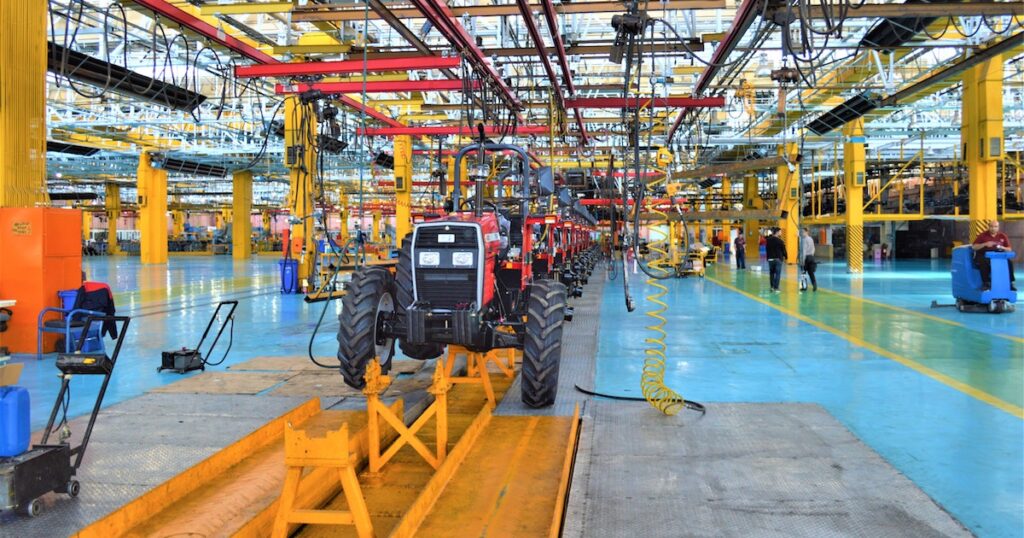
How Much Will You Make With a Master's in Business Analytics?
A master's in business analytics can help you land a [...]

A lot of raw materials, processes, people, money, and other resources go into making, moving, and marketing products: supply chain professionals source and track them all. It can be an overwhelming job, and people who work in supply chain logistics are paid accordingly. Entry-level supply chain specialists with undergraduate degrees earn $51,000, while the median supply chain specialist salary is about $87,000. And, with the right degrees and certifications, supply chain managers can earn $114,000 or more annually.
Surprisingly—given the stressful nature of this complex work—supply chain managers are an exceptionally happy group. In the 2020 Association for Supply Chain Management Salary and Career Survey, 80 percent of respondents rated their job satisfaction as 8 or higher on a 1-to-10 scale. Supply chain professionals—including supply chain managers—really like their jobs.
The high pay and high levels of job satisfaction that go hand-in-hand with logistics work haven’t led to a surfeit of supply chain professionals, however. It’s still relatively easy to land a job in supply chain management, and you might not even need an advanced degree to break into this field. In this article explaining how to become a supply chain manager, we cover:
In the simplest possible terms, supply chain management (or SCM) is the oversight and management of the flow of raw materials, work-in-progress inventory, and finished goods. The supply chain encompasses every origin point, manufacture point, distribution point, marketing and sales channel, and consumption point. Supply chain management can also involve directing supply chain activities and building supply chain infrastructure. That’s why supply chain managers need to have an understanding of systems engineering, operations management, logistics, procurement management, and marketing.
Depending on what a business produces and distributes, a supply chain can include thousands of suppliers, manufacturers, transporters, warehouses, sales channels, vendors, and workers. Whether a supply chain is big or small, however, the end goal of all strategic SCM is to get goods manufactured and into the hands of consumers as efficiently and as cheaply as possible.
Supply chain managers (who are sometimes called SCMs) coordinate elements of every part of the supply chain in every industry, from energy to manufacturing to retail. Every company has different needs, so one supply chain manager may spend more time on planning and sourcing while another spends more time on retail management and delivery. Generally, the work of SCMs falls into one of three silos:
SCMs spend a lot of time looking at current supply chain strategies and recommending improvements to their employers that will decrease costs, streamline operations, boost productivity, and speed growth. When you become a supply chain manager, you may also be responsible for building and maintaining partnerships with suppliers, manufacturers, transporters, channel partners, and returns processors.
Logistics is a complex field, so most supply chain managers have at least a bachelor’s degree. Some SCMs opt for a Bachelor of Business Administration in Supply Chain Management or Bachelor of Science in Supply Chain Management, but others have degrees in business or process engineering. About 41 percent of supply chain managers stop there, but 48 percent go on to earn master’s degrees like the Master of Science in Supply Chain Management (MSSCM) or the Master’s in Supply Chain Management (MSCM). Some colleges and universities offer a Master of Engineering in Supply Chain Management, an MBA in Supply Chain Management, or a Master of Applied Science in Supply Chain Management.
You don’t technically need a master’s degree to become a supply chain manager. Still, having a master’s in supply chain management or a supply chain management MBA may give you a competitive edge when you’re looking for work or negotiating your salary.
Students in supply-chain management degree programs at the bachelor’s degree and master’s degree levels study the techniques and technology necessary both to produce goods and manage inventory and distribution, domestically and internationally. Courses in supply chain management degree programs usually cover:
It’s important to remember that coursework isn’t all it takes to build a supply chain career. The best supply chain management degree programs give students opportunities to study logistics and operations in real-world settings through internships, research, and fieldwork partnerships. They also prepare students to earn industry certifications like the Certified Supply Chain Professional (CSCP) designation, the Certified in Logistics, Transportation and Distribution (CLTD) designation, or the Certified Master Logistician (CML) designation.
Successful SCMs may come from different academic backgrounds, but they do share some traits. To succeed in this role, you’ll need to have:
Depending on the employer, a supply chain manager might be a terminal position. Or, a supply chain manager might report to a supply chain director or VP of supply chain management. Some companies even have a chief supply chain officer, though this role is relatively rare.
Before we look at those roles, let’s look at how long it takes to become a supply chain manager and where SCMs typically get their start. Many supply chain professionals launch their careers as supply chain analysts, supply chain specialists, purchasing managers, planning managers, or strategic sourcing managers after earning a Bachelor of Science in Supply Chain Logistics or Bachelor of Supply Chain Management.
After amassing a few years of experience, some supply chain professionals enroll in a two-year master’s degree program in supply chain management or an accelerated SCM program like the 10-month program at Massachusetts Institute of Technology. Graduates of these programs are qualified to oversee multiple supply chain functions and are comfortable working with people in finance, research and development, sales, marketing, quality control, and distribution. At this point, a supply chain professional might become a senior supply chain analyst, move into a supply chain manager position, become director of supply chain management, or join the ranks of supply chain executives.
Experienced SCMs at companies that treat supply chain manager as a terminal role sometimes strike out on their own and become supply chain consultants. These professionals help companies that may or may not have an in-house SCM address specific supply chain issues.
It’s entirely possible to work in supply chain logistics with just a bachelor’s degree and work up to a management-level position. Getting a master’s degree will certainly give you an advantage when you’re looking for work, but depending on where your interests lie, the boost in hireability you get from a master’s degree might not be worth the cost of that degree—especially if you’re going into transportation and distribution.
According to one Quora commenter, the easiest way to get started in supply chain logistics is to start applying for jobs. “Supply chain and logistics is a part of industry that currently needs a lot of manpower to run, and people are always looking for people willing to help out,” Mark Grinstein-Camacho wrote. “If you’ve finished college, have at least a basic understanding of Excel, and can explain why you want to work in logistics, you should consider yourself qualified for an entry-level position.”
As shown above, supply chain managers can earn a lot, but not all do. Supply chain manager is an umbrella term that applies to many different positions, depending on the needs of a company. Supply chain management professionals may be SCMs, but some have titles like:
The most lucrative supply chain management jobs pay above $90,000, and some pay well over six figures. These include:
Well, it isn’t all sunshine and rainbows in logistics. This job can be stressful—even the entry-level positions—because production and distribution happen around the clock. You might sleep when you build a supply chain management career, but the supply chain is active 24/7, which means issues can arise at any time. You’ll also shoulder a lot of responsibility in this role, and when those issues do arise, everyone will be looking to you to find a solution fast, day or night.
But there’s an upside. Every year, hundreds of companies looking for supply chain managers leave positions unfilled because there aren’t enough qualified applicants. According to the University of North Texas, there are a whopping five jobs available for every one supply chain management graduate. That’s part of why SCMs are paid so well and also why they enjoy a level of job security most other professionals don’t. The bottom line is that if you find this work interesting, SMC isn’t just a good career—it’s a great one.
(Last Updated on February 26, 2024)
Questions or feedback? Email editor@noodle.com

A master's in business analytics can help you land a [...]

Companies are desperate to fill analytics management positions, and having [...]

A PhD in Business Analytics prepares you for a career [...]

Operations research mines and interprets data to devise improvements in [...]

Channel marketers across the board earn good money. There are [...]
Categorized as: Supply Chain Management, Business & Management